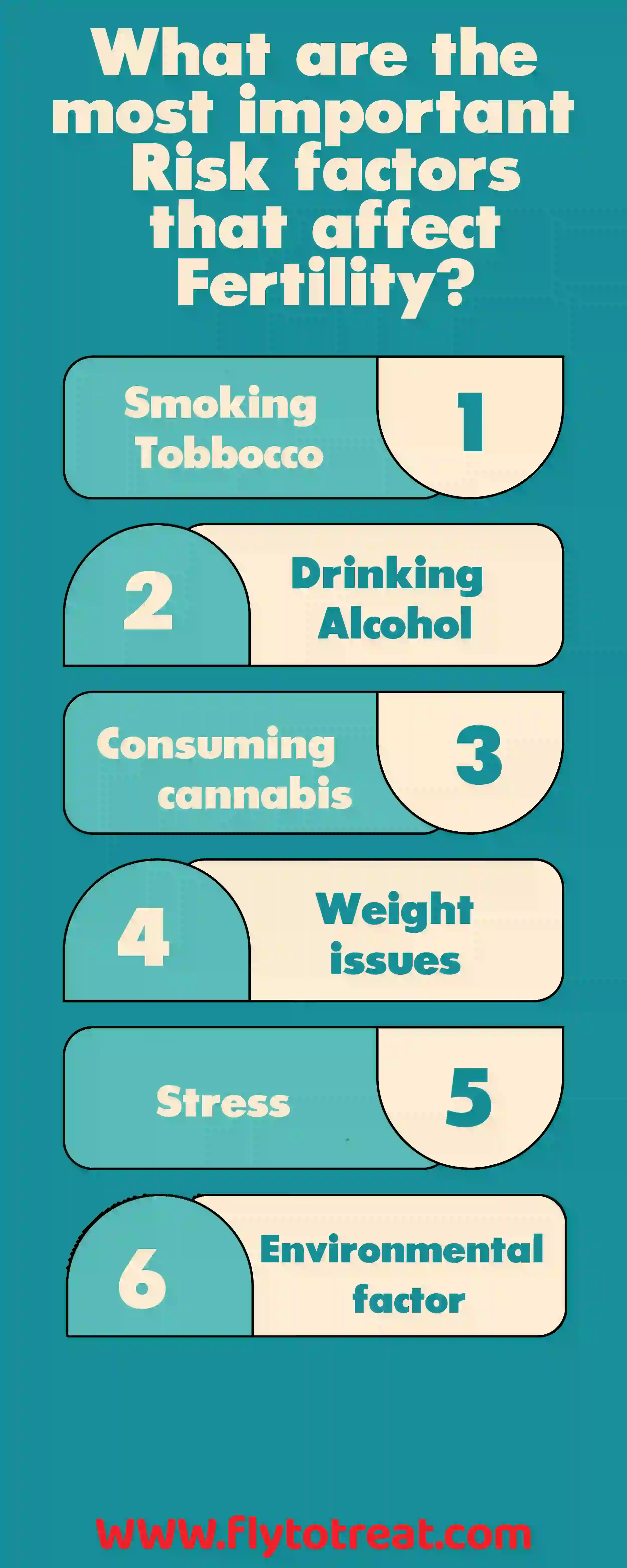
What can be the cause of infertility? Am I infertile?
Understanding the classification of infertility and infertility causes is crucial for addressing the various challenges couples face when trying to conceive. This article, prepared by FlyToTreat, delves into essential questions like "How to resolve infertility?", "What are the four types of infertility?", and "What are the three main causes of infertility?". It provides comprehensive insights into different infertility types and the factors that contribute to this condition, aiming to guide individuals and couples through the complexities of infertility diagnosis and treatment.
How do I know if I'm infertile?
Infertility is defined as the inability to conceive after one year of regular, unprotected sexual intercourse. However, there can be earlier signs depending on the type of infertility. Here's a basic guide, but remember to consult a doctor for diagnosis:
• Female Infertility Symptoms:
o Irregular or absent periods
o Painful periods
o Difficulty maintaining a pregnancy (miscarriage)
• Male Infertility Symptoms:
o Low sperm count
o Abnormal sperm shape or movement
o Undescended testicles
• Combined Infertility: This occurs when both partners have factors contributing to infertility. It might be a combination of male and female factors that together reduce the likelihood of conception
• Unexplained Infertility:
o No identifiable cause in either partner after testing
These are just some indications. If you're concerned about infertility, it's important to see a doctor. They can perform tests to determine the infertility causes, and classification of infertility and create a personalized treatment plan to help you achieve pregnancy.
What are the four types of infertility?
Understanding the classification of infertility involves recognizing the different types of infertility that affect individuals and couples. Generally, there are 2 types of infertility: primary and secondary. Hence, there could be 4 different states for not getting pregnant:
• Male Infertility: Issues such as low sperm count, poor sperm mobility, and structural problems like varicocele can impair male fertility. Hormonal imbalances, including low testosterone, also play a significant role.
• Female Infertility: Problems with ovulation, blocked fallopian tubes, uterine abnormalities, and hormonal imbalances can lead to female infertility. Conditions such as endometriosis and polycystic ovary syndrome (PCOS) are the most common cause of infertility in couples.
• Combined Infertility: This occurs when both partners have factors contributing to infertility. For instance, one partner may have a low sperm count while the other has ovulatory issues.
• Unexplained Infertility: Sometimes, despite thorough medical evaluation, no specific cause can be identified. This type accounts for a significant portion of infertility cases and often requires advanced treatments like assisted reproductive technologies (ART).
Recognizing these infertility types helps in determining the infertility causes and appropriate treatment strategies. Understanding the different types of infertility is crucial for addressing this widespread issue effectively.
What are the three main causes of infertility?
So, trying to get pregnant but facing some challenges? It happens! There are different reasons why couples might struggle with infertility, and understanding these reasons is the first step to finding the right treatment.
Let's break it down:
• Can ovulation problems cause infertility? ovulation problems are a primary cause of female infertility. Conditions like polycystic ovary syndrome (PCOS) and thyroid issues can disrupt the regularity of eggs release. These hormonal imbalances prevent proper ovulation, leading to difficulties in conceiving.
• How do problems with sperm affect fertility? Male infertility often arises from issues with sperm production or function. Low sperm count, poor sperm mobility, or abnormalities in sperm shape can hinder fertilization. Environmental factors, lifestyle choices, and medical conditions like varicocele are also one of the most common causes of infertility in couples.
• Can uterine problems cause infertility? Blockages or damage to the fallopian tubes, often caused by pelvic inflammatory disease (PID), endometriosis, or previous surgeries, can prevent the sperm from reaching the egg. Abnormalities of Uterine abnormalities, such as fibroids or congenital malformations, can also impede implantation and subsequent pregnancy.
Recognizing these infertility types and understanding helps in determining the appropriate treatment strategies for couples facing infertility. Knowing the different types of infertility and their underlying causes is essential for effective management and treatment.
Female infertility causes
Several factors can contribute to female infertility, which is a significant cause of not getting pregnant. Ovulation disorders, such as Primary Ovarian Insufficiency (POI) where menopause occurs before age 40, and Polycystic Ovary Syndrome (PCOS), a hormonal imbalance affecting ovulation, are common infertility causes. Fallopian tube blockages from infections or endometriosis can prevent the egg and sperm from meeting. Endometriosis itself, where endometrial tissue grows outside the uterus, can disrupt fertility. Hormonal imbalances, like hyperprolactinemia (high prolactin levels), affect ovulation.
Abnormal cervical mucus can hinder sperm mobility. Medical conditions such as cancer treatments (radiation and chemotherapy) and thyroid problems can affect ovulation and implantation. Age-related decline, where egg quality and quantity decrease naturally after 35, also makes pregnancy more challenging. Uterine issues can prevent successful implantation even if fertilization occurs. Understanding what can cause infertility, including these factors, is crucial for addressing fertility issues. While adenomyosis is another condition that can cause infertility, the assumption that the alcohol cause infertility is still being studied, as excessive consumption may impact reproductive health.
What are 5 risk factors that affect fertility?
• Does smoking affect your reproductive system? This factor hinders fertility by affecting both conception and sperm health.
• Can alcohol cause infertility? The safest approach is to avoid alcohol entirely to minimize risks to your baby. Excessive alcohol consumption can also affect sperm quality. The UK Chief Medical Officers recommend that adults drink no more than 14 units of alcohol per week, spread evenly over three or more days.
• Does cannabis risk pregnancy? Cannabis may impact fertility, but further research is required. Its use during pregnancy has been associated with negative health effects on unborn babies and may increase the risk of miscarriage and stillbirth.
• Can weight be a cause of infertility? An inactive lifestyle and being overweight or obese can increase infertility risk and lower semen quality. Being underweight, having eating disorders like anorexia or bulimia, or following a very low-calorie diet also raise the risk of fertility problems.
• Can stress cause infertility? Stress can affect your relationship with your partner and reduce your sex drive. In severe cases, it may also impact ovulation and sperm production.
• How does the environment affect fertility rates? Exposure to certain pesticides, solvents, and metals has been shown to impact fertility, especially in men.

What are the main causes of infertility in males?
Here's a revision of the H2 section on Causes of Male Infertility that incorporates more explanation while keeping some bullet points and targeting the keyword "infertility causes":
Male infertility is the inability of a man to get his partner pregnant. Several factors can contribute to this condition, affecting sperm production, mobility, or delivery. Let's talk about male infertility:
What can cause infertility in men?
• Sperm Disorders: This is a common culprit.
o Low sperm count or zero sperm: Makes fertilization difficult or impossible.
o Weak sperm movement: Healthy sperm need to be strong swimmers!
o Abnormal sperm shape: Affects their ability to reach and penetrate the egg.
o Reduced sperm production: Various factors can hinder this process.
• Underlying Health Conditions: Several issues can contribute to sperm problems:
o Testicular problems: Injuries, infections, or undescended testicles.
o Varicoceles: Enlarged veins in the scrotum impacting sperm production.
o Hormonal imbalances: Testosterone deficiency can be a factor.
o Genetic conditions: Cystic fibrosis and others can play a role.
o Medications: Chemotherapy or anabolic steroids can affect fertility.
o Environmental toxins: Exposure can harm sperm health. Alcohol consumption is another big one, reducing sperm production and quality.
• Blockages: These can prevent sperm from reaching the egg:
o Genetic abnormalities or birth defects in the reproductive system.
o Past surgeries or scarring from infections like STIs.
• Other Lifestyle Factors: These can also influence fertility:
o Chronic health problems: Diabetes, thyroid issues, etc.
o Stress: Can disrupt hormone regulation and sperm production.
o Weight: Obesity can negatively impact sperm health.
Can infertility be cured?
Yes, there are many treatment methods and each has its stages. Infertility treatment usually starts with medication. If the results were disappointing, IVF would be considered. is the most common treatment for and has:
• What Is In Vitro Fertilization (IVF)? This is a medical procedure that helps couples facing infertility conceive. What can cause infertility is varied, but IVF bypasses some of these issues. Eggs are retrieved, fertilized with sperm in a lab dish (called a petri dish), and then healthy embryos are implanted in the uterus. There are different approaches to IVF depending on the specific situation.
• ICSI (Intracytoplasmic Sperm Injection): This is a specialized technique used in IVF to help couples facing male infertility achieve pregnancy. What can cause infertility in men can vary, but ICSI increases the chances of fertilization. A single sperm is injected directly into the egg, bypassing the need for sperm to fertilize the egg on its own. This is particularly helpful for low sperm count, poor sperm motility, or certain sperm abnormalities.
• What is Surrogacy? While IVF is a process of creating healthy embryos, surrogacy focuses on carrying the pregnancy for someone else. Not all surrogacy uses IVF - in traditional surrogacy, the surrogate's egg is used. However, IVF is the most common method used in surrogacy today.
• What is Preimplantation Genetic Testing (PGT)? This is used to screen embryos for genetic diseases before they are transferred.
• Cryopreservation: This involves freezing eggs, sperm, or embryos for future use.
• Donor Eggs/Sperm: This refers to using eggs or sperm from a donor when necessary.
• Surrogacy: This is when another woman carries the pregnancy if the intended mother is unable to do so.
Is infertility genetic?
Infertility can have a genetic component, influencing both infertility types and treatment options. Here are some key points:
• Does infertility run in the family? Approximately 10 to 15 per cent of infertility cases are linked to genetic causes. These include chromosomal abnormalities and single-gene mutations that affect reproductive health.
• Male Infertility: Conditions like Klinefelter syndrome (extra X chromosome) and Y chromosome microdeletions can lead to low sperm production or poor sperm quality. These genetic issues are often inherited and can be detected through genetic testing.
• Female Infertility: Genetic disorders such as Turner syndrome and Fragile X syndrome can impact ovarian function and egg quality. Family history can play a significant role in these conditions, affecting the ability to conceive.
Understanding the classification of infertility and its genetic links helps in diagnosing and managing different types of infertility. Genetic counselling and testing can provide valuable insights for couples facing infertility.
Conclusion
In conclusion, infertility is a multifaceted issue with various types and causes, ranging from hormonal imbalances and structural problems to genetic factors. While not all infertility cases can be completely cured, numerous treatments and lifestyle changes can significantly improve the chances of conception. FlyToTreat is committed to providing the necessary support and information to help couples navigate these challenges and find the most effective solutions tailored to their specific needs. Understanding the different types of infertility and underlying infertility causes is the first step towards effective management and successful treatment.
MEDICALLY REVIEWED BY: Dr. Ali Bazazi
AUTHOR: FlytoTreat's team of Authors
28 May 2024 - Updated At: 03 July 2024
Related Articles
Comment





